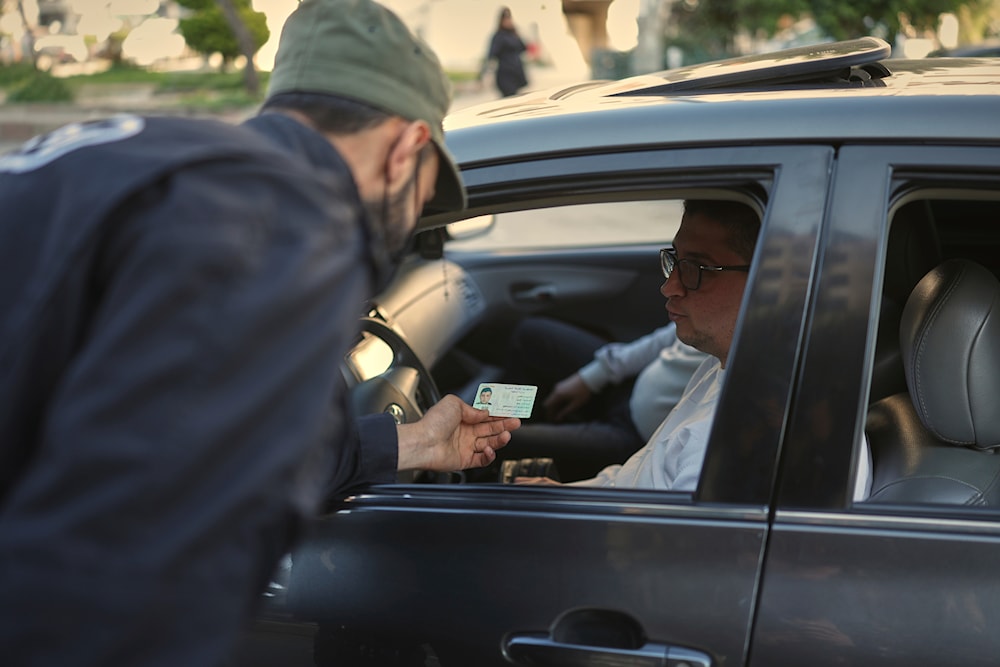Latakia residents urge action against checkpoint harassment
Security Forces have set up many checkpoints in Latakia City, where residents reported repeated harassment by personnel operating these inspection points
-

A Syrian security check the ID of a driver at a checkpoint, following a recent wave of sectarian violence across the Syrian coast, Latakia, Syria, Tuesday, March 11, 2025 (AP)
As life goes back to normal in Latakia following massacres that saw the killing of thousands on the Syrian coast, residents of the city of Latakia called on the authorities on Sunday to put an end to harassment by security personnel operating checkpoints in the area.
Local sources informed Al Mayadeen on Sunday that many neighborhoods are beginning to come back to life, particularly in the evening hours. However, the al-Zira'a neighborhood continues to experience limited activity at night. Residents are urging shop owners to extend their hours in an effort to revive the area, once one of the busiest in the city due to its proximity to university housing.
In the al-Da'tour neighborhood, residents are still grappling with the aftermath of a massacre that claimed over 100 civilian lives, with many still missing. The area sees some movement during the day but is nearly deserted by evening, as regime security forces maintain heavy checkpoints surrounding the neighborhood and along the roads leading to it.
Checkpoint personnel conduct thorough identity checks on those entering and leaving, with some engaging in harassment, while others remain respectful and conduct their duties without misconduct. Additionally, some continue to question individuals about their sect as they pass through.
This has created a sense of anxiety among residents when leaving the neighborhood for the city center, prompting them to call on provincial security leadership to intervene and end the harassment. These actions have been hindering the revival of many neighborhoods, as residents avoid leaving their homes to escape such encounters.
In addition, the residents called on the authorities responsible for the province of Latakia to curb the repeated violations committed by checkpoint personnel at the Naval School, after verbal violations targeted citizens of all sects, with security forces accusing them of being former regime militias.
Syria on path to fragmentation, al-Sharaa has limited time to act: FT
The violence that erupted in Syria’s coastal cities is a troubling indication of the country’s potential fragmentation along sectarian lines, suggested John Sawers, the former head of the UK’s foreign intelligence service (MI6), in an opinion piece published in the Financial Times.
Sawers stressed that sectarian violence serves as a "wake-up call" for Syria’s interim president, Ahmad al-Sharaa, adding that his promise to form an inclusive government "has so far proved largely empty."
He further asserted that al-Sharaa had self-appointed himself to power, noting that he focused on consolidating authority for himself and the narrow bloc he led during last month’s National Dialogue conference in Damascus, which was attended by "other opposition groups."
The report recounted that Hay'at Tahrir al-Sham (HTS), led by al-Sharaa, emerged from al-Qaeda’s Syrian branch, highlighting that the interim president and his armed followers "are still rooted in a brand of Salafist Islamism that is unpopular even within the majority Sunni community."
Sawers pointed out that al-Sharaa appointed his HTS aides to senior positions in the new military after dissolving the former Syrian Arab Army and police force, arguing that he had repeated: "the painful mistakes the Americans made in Iraq after the fall of Saddam Hussein’s regime."
The former MI6 chief emphasized the need for al-Sharaa to act swiftly to demonstrate his commitment to building an inclusive Syria, warning that "trying to re-establish autocratic power in such a diverse country is a recipe for violent resistance."

 4 Min Read
4 Min Read








